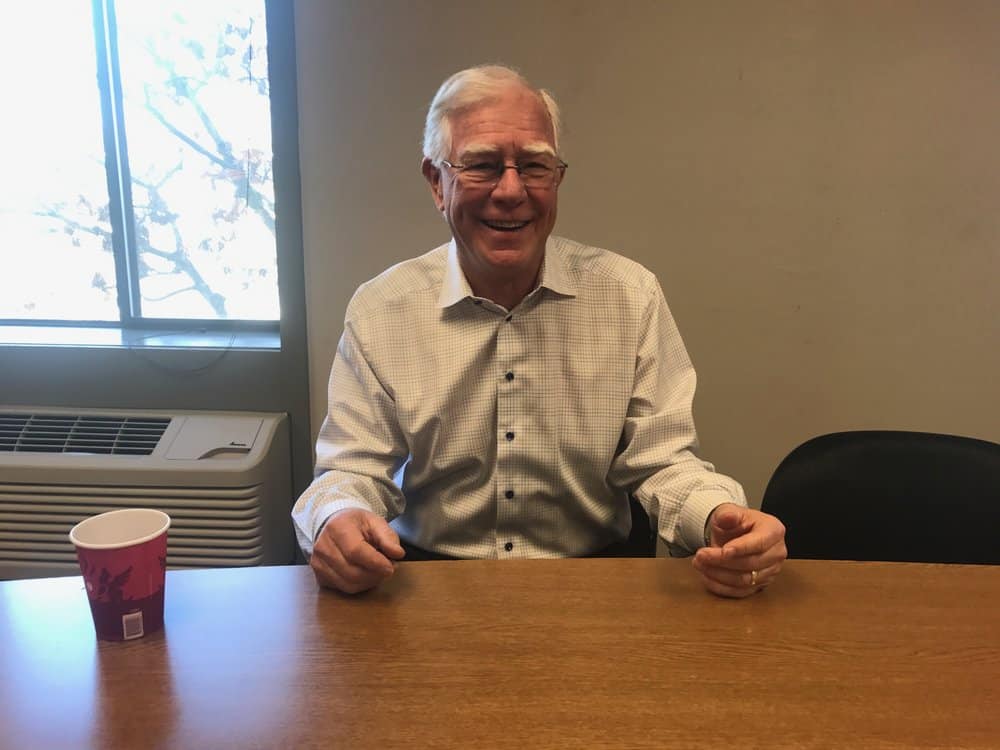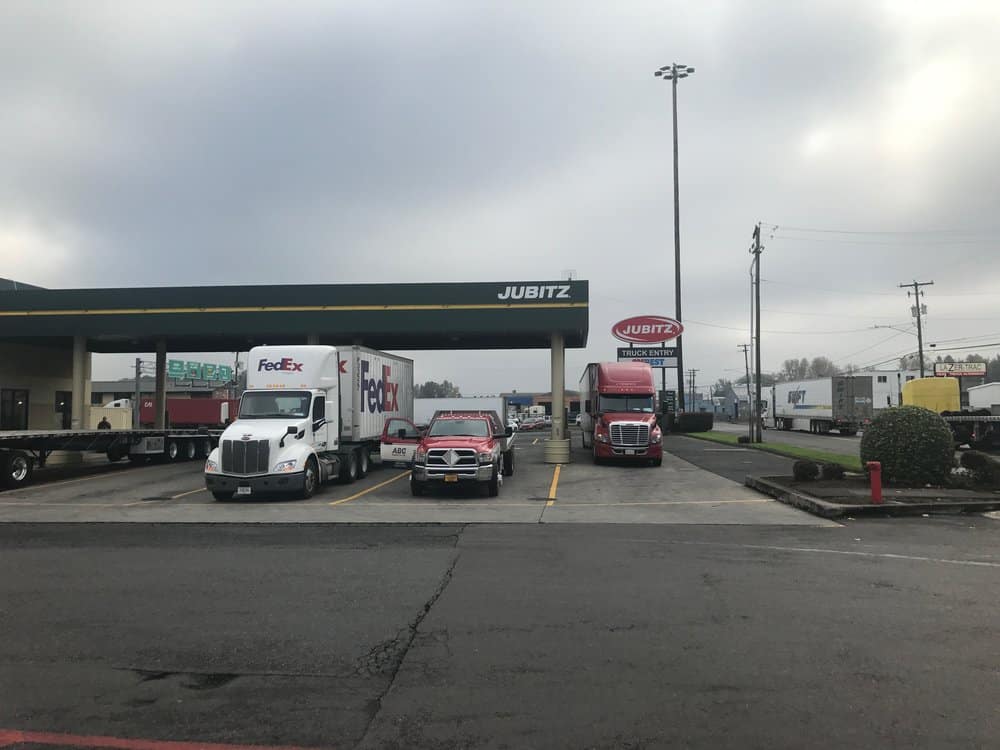Way before DAT Solutions was even a twinkle in Fred Jubitz’s eyes, the CEO of Jubitz Corporation was making history at the company’s flagship travel center.
“We worked the center’s first 24-hour shift,” said Jubitz, referring to his brother Al. “That was in 1960. We had four customers.”
Fifty nine years later, Jubitz, one of the largest independently-owned full service truck stops in the country, welcomes around 1,500 truckers a day. They flock to this 27-acre Portland destination as much for the movie theater, hotel, restaurant, two delis, laundromat, shoe repair, nightclub and dog shower as the truck stop’s coveted 300 parking spaces and fueling services.
Jubitz founded DAT as a separate unit in 1978 — “it was my idea, Al executed,” Jubitz said — then sold the business in 2001. (Full disclosure: DAT will provide the index for final-day cash settlement on the freight futures contract on Nodal Exchange, developed in conjunction with FreightWaves.)
The software business is no longer theirs, but the namesake truck stop buzzes along, bringing in about $40 million of the company’s $175 million annual revenues even as the industry contracts and braces for tech and regulatory headwinds.
There are about 5,000 truck stops in the U.S. according to NATSO, formerly the National Association of Truck Stop Operators. More and more of them are chains.
In 2005, in the full service truck stop category, there were 1,031 independents vs 704 chains. By 2015, the numbers had completely reversed: 705 independents vs 1,091 chains.
Foreign interests are circling. In August, Enex, a subsidiary of Chile-based Quiñenco SA, acquired one of the largest truck stop chains, Road Ranger.
Larger outfits get a better deal on fuel purchasing, said NATSO president Lisa Mullings. Convenience store chains are also getting into the truck stop fuel business as hauling times shorten and local deliveries increase. “The Amazon effect,” Mullings said.

Founded by Moe Jubitz (father to Al and Fred) in 1952 as a truck leasing company, Jubitz remains “fiercely independent,” its chief said.
“World class customer experiences, that’s our mantra. Every driver that shows up is greeted with a smile and leaves with a thank you. It’s not rocket science.”
On a recent weekday, a steady stream of trucks lined up at the Travel Center’s fueling stations.
Inside Moe’s deli, refrigerated LTL driver Don Stone was heading home to Prosser, Oregon, after shipping product to the Midwest. “Jubitz is a lot nicer than most,” Stone said. The prices are bit higher than other truck stops. “But that’s Portland.”
Driver Steve Zettlemoyer was finishing up a hot roast beef sandwich in the Ponderosa Lounge and Grill. “I’ve been coming here for eons,” he said. “The parking lot is big.” He dismissed the offerings of a nationally-known chain by saying he wouldn’t stop there: “All they have is fast food.”
“I like meals,” said Zettlemoyer.
As parking rises to the top of driver concerns, Jubitz’s expansive lot is an anomaly, all the more so because it sits smack in the middle of a major metropolitan area.
But sitting on 300 parking spaces doesn’t keep Jubitz from worrying about how hours of service rules and ELDs could erode business. “Drivers are allowed 14 hours total a day, and that includes driving rest periods. So if truckers are sitting in Salem [about 50 miles south of Portland], they may not come here because of the massive traffic jams we have on Interstate 5.”
A dramatic decline in long haul runs is also a concern.
“A 400-mile drive — that’s a lot different than going from here to Chicago and spending the night on the road,” Jubitz said. “That’s less guys that need to spend the night here, either in a parking lot or hotel going forward.”
On the subject of electrification and autonomous trucking, Jubitz is agnostic. On the one hand, autonomous trucking eliminates his customer base. But partial autonomy and electrification could boost business, if electrical infrastructure moves on-site and truckers mosey into the restaurant while recharging batteries.
“We will bring to the plate any product or service needed by the industry, whether it be diesel natural gas, hydrogen, electricity. If that’s the way industry is going to move, that’s the way we’ll move with it.”
Much of the company’s expansion in recent years has come from its fuel selling business. Jubitz is a franchise holder for Pacific Pride and CFN.
“That’s been going on for a lot of years,” Jubitz said. “But we’ve been more aggressive in growing in recent years.”
DAT, Jubitz said, grew out of a problem he and his brother “saw right here on our property.” Freight brokers would call in with a load request, and switchboard operators jotted down the information on index cards posted to the restaurant bulletin board.
“That became a messy system,” he said.
So Jubitz traveled to Chicago, aiming to create a TV monitor system modeled after the United Airlines airport terminals. His brother Al, DAT’s founder and former president, had a Master’s Degree in computer science and helped put the plan in action. At one point there were 1,300 television monitors installed in truck stops around the country. They have since disappeared, replaced by online technology.
Al is no longer part of the Jubitz Corporation. Fred bought out his brother 15 years ago.
Now a new generation is coming into the fold. Fred’s two sons, Matthew, 39, and Neil, 32, started working for Jubitz this year.
“I told my kids: ‘This is what I’ve done. We have a financially solvent company,’” Jubitz said. ‘Once I’m out of the picture you do what you want. I’m not going to roll over in my grave.’”
“Like when my dad brought Al and I in — the original idea was truck leasing. The truck center wasn’t even thought of when he started.”











